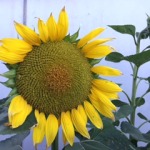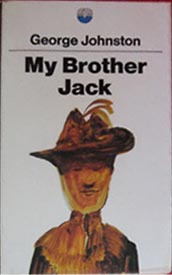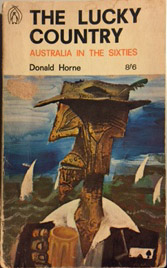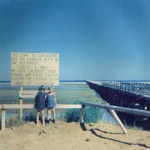 I’ve been having a lot of trouble getting out of bed in the morning. As I’m working from home, there’s no need to be up at six, or seven, or eight. Or nine, or even ten. And having begun the day late, it’s impossible to sleep early, so each day is starting later, ending later. In the 1990s I had friends who lived in Philpott Street, Marrickville, who had let this process reach its logical conclusion: they awoke just before dusk and went to bed again at first light. I remember being there at about one o clock in the morning while they ate and chatted as if it were one in the afternoon. I can’t let things get that bad, I tell myself. I’ll have to start getting up earlier. But then, suddenly, it’s morning again. I feel like I only just got to sleep ten minutes ago. I decide to snooze a little bit longer.
I’ve been having a lot of trouble getting out of bed in the morning. As I’m working from home, there’s no need to be up at six, or seven, or eight. Or nine, or even ten. And having begun the day late, it’s impossible to sleep early, so each day is starting later, ending later. In the 1990s I had friends who lived in Philpott Street, Marrickville, who had let this process reach its logical conclusion: they awoke just before dusk and went to bed again at first light. I remember being there at about one o clock in the morning while they ate and chatted as if it were one in the afternoon. I can’t let things get that bad, I tell myself. I’ll have to start getting up earlier. But then, suddenly, it’s morning again. I feel like I only just got to sleep ten minutes ago. I decide to snooze a little bit longer.
This morning, at a time that felt like the middle of the night, I heard a short, sharp buzz. It was a text message from a friend inviting me to have morning tea at ten o clock, two hours hence. I went back to sleep. At five minutes to ten, I hauled myself out of bed and got around the corner to Fiona’s place. I told her that while I was physically present, my mind was not actually awake. She fed me a cup of coffee and the rich smell offered a magic carpet ride to the land of youthfulness, wakefulness and vigour.
She read me Shakespeare’s second sonnet.
When forty winters shall besiege thy brow,
And dig deep trenches in thy beauty’s field,
Thy youth’s proud livery so gazed on now,
Will be a tattered weed of small worth held –
It’s about what happens when one is over forty, and one’s brow is furrowed and one is just a tattered bit of seaweed washed up on some godforsaken shore and nobody can even be bothered to look at you …
The solution to this grim state of affairs, says Shakespeare, is to have lots of children. That way, you can continue to be young and beautiful because your children will be young and beautiful. You can gaze upon them and that will comfort you in your hours of pointlessness. Fiona’s brow has been besieged by forty winters; mine ten more. Between us we have not had one child; we are without remedy for the cruel ravages of time’s scythe.
Except for coffee. The coffee did the trick. I’d come as a tattered weed but I was leaving as a strong, bright sunflower like the ones that are growing against the fibro wall out the back, reminding me of all the other sunflowers of my life. They’ll grow anywhere. Galahs love the seeds. I may not have children, but I can always find a galah or a sunflower to get a dose of cheerful, hardy things (unlike, say, the white rhino, whose days are definitely numbered).
 Back home, as I did the dishes, I listened to a program on ABC Radio National about George Johnston’s My Brother Jack. It’s fifty years since the book was published. George Johnston and Charmian Clift and most of their children – non-hardy creatures – are long gone, but the book lives on. I’ve carted my copy around since I first read it as a teenager. Images from the book are companions through my life. Insects still drop out of the dollicus*. Prosthetic limbs and a gas mask clutter the hallway. The gum tree in the front yard that Helen didn’t like because it was messy grows tall and strong in the Australian light; a broken man, falsely accused of murder, tends his roses. The green eyeshades worn by the copy editors at the Argus and the crumpled trench coats and pork pie hats worn by the reporters. When I told my English lit teacher how much I loved the book, she sneered: “What about the development of the female characters?” I was taken aback. I had so thoroughly identified with the tortured David Meredith (endlessly contrasted with his brave, straightforward brother Jack) that I had barely noticed Johnston’s two-dimensional portrayals of Sheila and Helen and Cressida.
Back home, as I did the dishes, I listened to a program on ABC Radio National about George Johnston’s My Brother Jack. It’s fifty years since the book was published. George Johnston and Charmian Clift and most of their children – non-hardy creatures – are long gone, but the book lives on. I’ve carted my copy around since I first read it as a teenager. Images from the book are companions through my life. Insects still drop out of the dollicus*. Prosthetic limbs and a gas mask clutter the hallway. The gum tree in the front yard that Helen didn’t like because it was messy grows tall and strong in the Australian light; a broken man, falsely accused of murder, tends his roses. The green eyeshades worn by the copy editors at the Argus and the crumpled trench coats and pork pie hats worn by the reporters. When I told my English lit teacher how much I loved the book, she sneered: “What about the development of the female characters?” I was taken aback. I had so thoroughly identified with the tortured David Meredith (endlessly contrasted with his brave, straightforward brother Jack) that I had barely noticed Johnston’s two-dimensional portrayals of Sheila and Helen and Cressida.
 The book keeps company on my bookshelf with Donald Horne’s Lucky Country, published the same year. My Brother Jack has a digger painted by Sidney Nolan. The cover of Horne’s slim paperback is by Albert Tucker. It’s a craggy painting of a bloke with a beer in his hand, an Ace of spades in his pocket and the glorious deep blue sea behind him. In the sea there are bright triangles that might be the sails of boats or the fins of circling sharks. Both books were searing critiques of Australian life that became, as the decades rolled on, part of the pantheon of Australian mythology. The Australia Johnston and Horne both loved and deplored began to vanish and as it vanished, a fantasy took the place of all the messy details. Australia was a wide brown land inhabited by sturdy, uncomplicated Jack Merediths. It is this Australia – this fantasy lucky country – that is brooded over and celebrated in drunken, flag-covered binges on Australia Day. It is the Australia evoked by those who say Fuck Off We’re Full and by John Howard when he laments the “black armband” view of history. It’s a sentiment that spiked during Monday’s Sydney siege but was tempered by Tuesday’s #illridewithyou.
The book keeps company on my bookshelf with Donald Horne’s Lucky Country, published the same year. My Brother Jack has a digger painted by Sidney Nolan. The cover of Horne’s slim paperback is by Albert Tucker. It’s a craggy painting of a bloke with a beer in his hand, an Ace of spades in his pocket and the glorious deep blue sea behind him. In the sea there are bright triangles that might be the sails of boats or the fins of circling sharks. Both books were searing critiques of Australian life that became, as the decades rolled on, part of the pantheon of Australian mythology. The Australia Johnston and Horne both loved and deplored began to vanish and as it vanished, a fantasy took the place of all the messy details. Australia was a wide brown land inhabited by sturdy, uncomplicated Jack Merediths. It is this Australia – this fantasy lucky country – that is brooded over and celebrated in drunken, flag-covered binges on Australia Day. It is the Australia evoked by those who say Fuck Off We’re Full and by John Howard when he laments the “black armband” view of history. It’s a sentiment that spiked during Monday’s Sydney siege but was tempered by Tuesday’s #illridewithyou.
 Speaking of history, I have been besieged by forty years and ten. My brow is not that furrowed, but there’s a whole part of me – recovering from cancer, missing body parts – that is definitely doddery. And like George Johnston in exile on Hydra, I miss the Australia of my early memories. A child’s world is a simple world. Some people are good and others are bad. Your legs can run you up the side of a levee bank or down a burning sand dune. Your abdomen contains its full quotient of pink organs that slide easily over each other as you go into a handstand. The deep blue sea meets a clear blue sky that arches over a wide brown land with a blue EH Holden moving purposefully across it.
Speaking of history, I have been besieged by forty years and ten. My brow is not that furrowed, but there’s a whole part of me – recovering from cancer, missing body parts – that is definitely doddery. And like George Johnston in exile on Hydra, I miss the Australia of my early memories. A child’s world is a simple world. Some people are good and others are bad. Your legs can run you up the side of a levee bank or down a burning sand dune. Your abdomen contains its full quotient of pink organs that slide easily over each other as you go into a handstand. The deep blue sea meets a clear blue sky that arches over a wide brown land with a blue EH Holden moving purposefully across it.
It’s driving into tomorrow, where things are different.
* The dollicus is the name the Meredith family gives a creeping vine in their back yard.